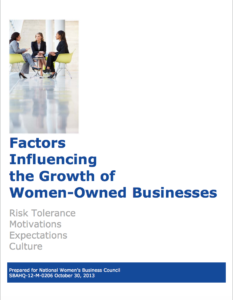Factors Influencing the Growth of Women-Owned Businesses: Risk Tolerance, Motivations, Expectations, and Culture 
National Women’s Business Council
First published October 2013
Like all entrepreneurs, women business owners face many challenges in making their entrepreneurship dreams a reality. Some of the challenges faced by women may be specific to women, due to the historical and cultural context within which they do their work. Women have the challenge of confronting and overcoming the historical barriers of being kept out of business and capital markets until the late 1980s. Even today, women’s access to information (or lack thereof) about financing strategies and opportunities may be limited due to a lack of access to the social networks where many key decision makers and capital players make deals. A lack of information about financing a business may result in more women raising lower levels of capital or pursuing only debt financing, which can limit their growth potential. Even more challenging are the cultural and personal challenges that women may face. Many women business owners also need to manage family-related responsibilities that still fall disproportionately on women despite progress in this area. Finally, some women struggle with being comfortable with living through and overcoming risk and failure, a critical skill set for any entrepreneur. Women still trail men in the size of business and business receipts, and women need to become more comfortable with risk in order to grow their businesses. All of these issues hit close to home for many successful business owners, yet, they are important to continue to explore, particularly in relation to how women start, grow, and expand their businesses.
The National Women’s Business Council (NWBC) initiated this research to understand the reasons behind the general lag of women-owned business growth in terms of business size and receipts, as compared to firms owned by men. Other studies have indicated that, on the whole, women and men approach entrepreneurship differently. In order to assist women, and the nation, to advance economically, the NWBC looked to the research to provide insights on key considerations when reaching out to women entrepreneurs to encourage maximum growth of their businesses. The research centered on questions about three key attitudinal areas associated with business ownership and growth: risk tolerance, motivations, and expectations. The research team also listened for instances where culture could be influencing behaviors or experiences.
Download Resource